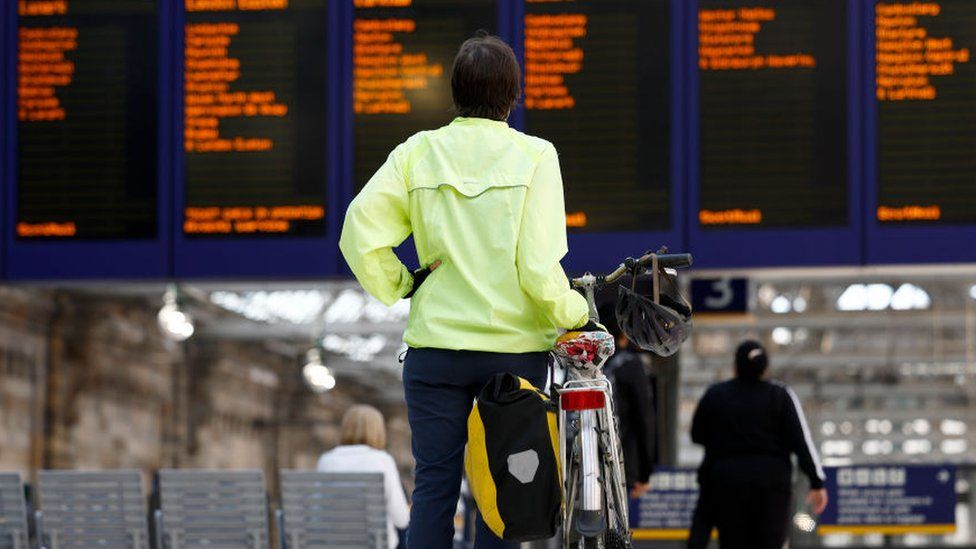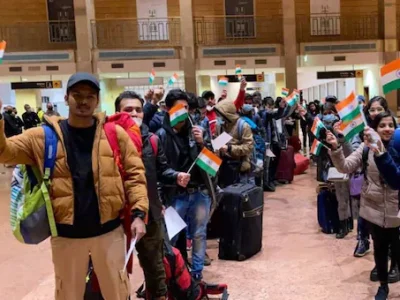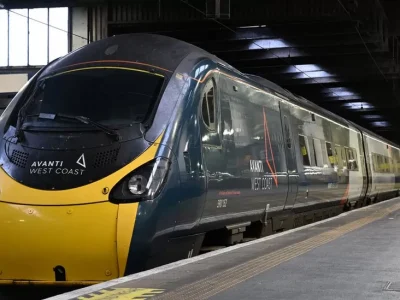Passengers are being warned to expect severe disruption as train services are hit by more strikes. Some 6,500 train drivers at nine rail companies, who are members of the Aslef union, are staging their latest 24-hour walkout in a dispute over pay. There have been several rail strikes this summer, with unions calling for pay increases in line with the rising cost of living. But rail companies said they could only fund a pay rise through reform. Avanti West Coast, Southeastern, CrossCountry, London Northwestern Railway and West Midlands Railway are running no Saturday services at all, while other operators will have an extremely limited service.
Transport for London has also advised passengers there will be no service on the entire London Overground network – which is operated by Arriva Rail London, whose drivers are part of the strike. The other operators affected by the strike are Great Western, Greater Anglia, LNER and Hull Trains. Train companies not involved in the strikes will be running services, but these are expected to be busy.

London Euston and Birmingham New Street are among the stations that will be closed on Saturday. The disruption is expected to spill over into Sunday morning – so passengers are being urged to check with their operator and consider starting their journey later in the day. Events including Coldplay’s second night at Wembley Stadium and Premier League games in Manchester, London, Birmingham and Brighton will be affected by the disruption, with thousands of travelling fans having had to make other arrangements.
Passengers are being advised to check before they travel and allow extra time for their journeys. Phoebe Clifford, 20, was planning to travel by train from her home in Canterbury to London for a Rex Orange County gig on Saturday with her boyfriend. However, the pair now have no way of getting there as no services are running. It means they will lose the £100 they spent on the concert tickets. She booked the tickets back in February as a birthday treat and had been looking forward to the gig for months. “I can’t sell my tickets because it’s too late. I was looking to book a hotel in case I could go down tonight, and I can’t do that either because they’re all fully booked,” she told the BBC. “It’s been an absolute nightmare,” Phoebe said she had been affected by every single train strike this year but still had sympathy for the workers and felt they deserved better pay.
Karim Ullah, who owns an Indian restaurant in Stansted Mountfitchet, Essex, will also be impacted. One of his chefs normally travels to work from London by train but no services are running on Saturday. “It really makes life such a misery because Saturday is one of our busiest, if not the busiest evening,” he said. Mr Ullah is also worried about last-minute cancellations from customers who were planning to travel by train as this happened during previous strikes.
Passengers with advance, off-peak or anytime tickets affected by the strike on 13 August can use their ticket either the day before, or up to and including Tuesday, 16 August. Passengers can also change their tickets to travel on an alternate date, or get a refund if their train is cancelled or rescheduled.
Season ticket holders who choose not to travel can claim compensation through the delay repay scheme. Mick Whelan, general secretary of Aslef, said drivers did not want to strike but unless the deadlock was broken there was a “big possibility” of more walkouts. The union is also balloting drivers at Chiltern Railways, Northern Trains and TransPennine Express for strikes, with the results due later this month.

Members of the RMT and TSSA unions are also striking on 18 and 20 August, while industrial action will be taken on 19 August by London Underground and London bus drivers. Mr Whelan told the BBC the government was not allowing train companies to offer a pay rise of more than 2%. But the Department for Transport said it was “entirely false” to claim the government was blocking negotiations. “We have said from the outset we urge the unions and industry to agree on a deal that is fair for railway staff, passengers and taxpayers,” the department said.
It said rail workers had seen above-average pay increases over the past decade, with their wages increasing by around 25% from £35,000 in 2011 to £44,000 in 2021. It added that rail staff pay rises must be “fair and in line with the wider public sector”. Steve Montgomery, chairman of the Rail Delivery Group, which represents train companies, said it was positive news that Aslef had agreed to meet them next week. He told the BBC companies wanted to offer a pay rise to workers but revenue had fallen since the pandemic. Mr Montgomery added that reforms were needed to terms and conditions, to save money by allowing staff to be more productive during their working hours.
![]()





